This is part of a series from The Rivalry naming the five greatest PBA players from UAAP and NCAA member schools. Some ground rules to explain the rankings:
1. Players are ranked according to their PBA achievements, and NOT their college achievements.
2. If a player played for more than one school in college, the series writers – Jay Mercado and Jude Roque – will decide between themselves which school the player will fall under.
3. Players who excelled in college but whose playing years preceded the PBA are unfortunately not included (i.e., Caloy Loyzaga for San Beda).
4. Players who played for a college or university before that school joined the UAAP or NCAA are included for consideration.
5. Only current UAAP and NCAA member schools are included in the series, but not necessarily all of them.
Mapua University (MU) Cardinals
Known for its outstanding engineering and architecture education, the Mapua University (formerly Mapua Institute of Technology) was established in 1925 by its founder Tomas Mapua, who is the country’s first registered architect. Located in Intramuros, Manila, MU has been a member of the National Collegiate Athletics Association (NCAA) since 1930, owning five men’s basketball crowns. Its men’s varsity squad is called the Cardinals, with gold and red as official colors. The Cards’ first title was won in 1949, while their last NCAA championship came in 1991 when head coach Joel Banal led the school to back-to-back titles. The school also produced seven league MVP’s in the NCAA namely Atoy Co, Freddie Hubalde, Leo Isaac, Alvin Patrimonio, Ruben Dela Rosa, Kelvin Dela Peña, and Allwell Oraeme.
Here is The Rivalry’s list of the five greatest PBA players from Mapua University:
5. Romulo Mamaril (NCAA 1975-76/PBA 1980-1991)
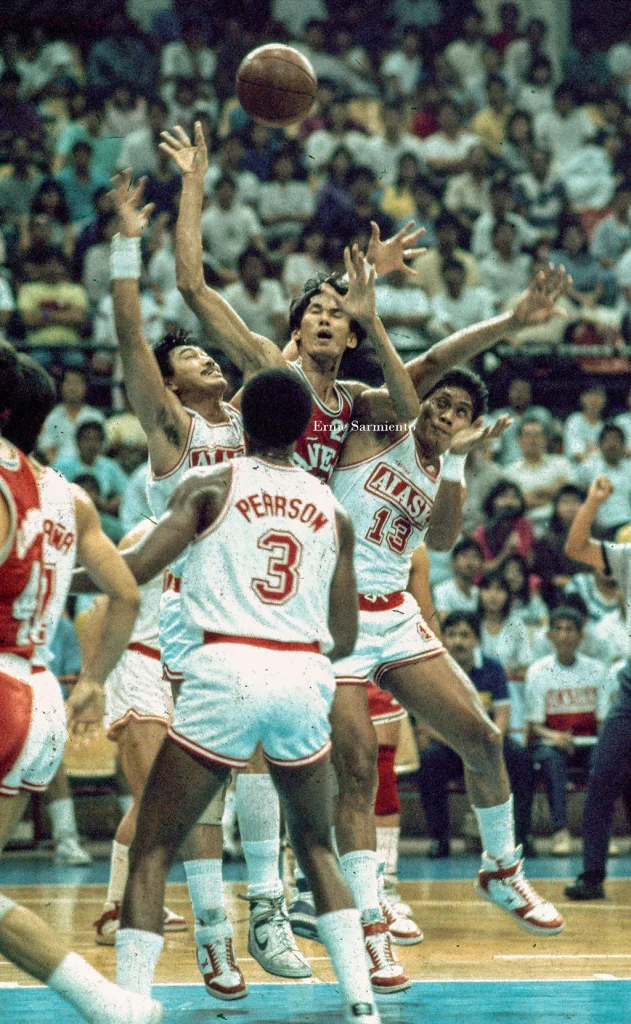
College career
Mamaril suited up for the Cardinals for two seasons, arriving one year after Hubalde had led the team to the NCAA finals. He was named to the RP Youth Team in 1976 which paved the way for a fruitful playing career in the MICAA.
PBA career
Accomplishments: 7x champion; played for five PBA clubs namely Crispa, Sunkist, Gilbey’s Gin, Tanduay, and Shell; played a total of 449 games, from 1980 to 1991, averaging 4.7 points and 4.6 rebounds.
Romulo “Romy” Mamaril, or “Mama” to his teammates, at 6’6” was among the tallest players in the Philippine Basketball Association (PBA) during his time. He entered the league in 1980 and played almost four seasons for the fabled Crispa Redmanizers team. Although he won four titles with Crispa, Romy took the backseat behind his more illustrious teammates like Abet Guidaben and Philip Cezar in the star-studded squad. But it was with Ginebra San Miguel/Añejo Rum that his star started to shine when playing coach Robert Jaworski took a chance on Romy as part of his team of mostly bench players from other clubs. Fondly called the “Human Beanpole,” Mamaril saw more playing minutes that eventually made him a key role player for the team. He was part of the Añejo/Ginebra batch when the “Never Say Die” battle cry came to life. With the franchise, Romy also gained three championship rings. He retired in 1991. Years later, his son Billy would follow his footsteps in the PBA and become one of the top centers in the league.
4. Leo Isaac (NCAA 1978-1981, PBA 1986-1995)
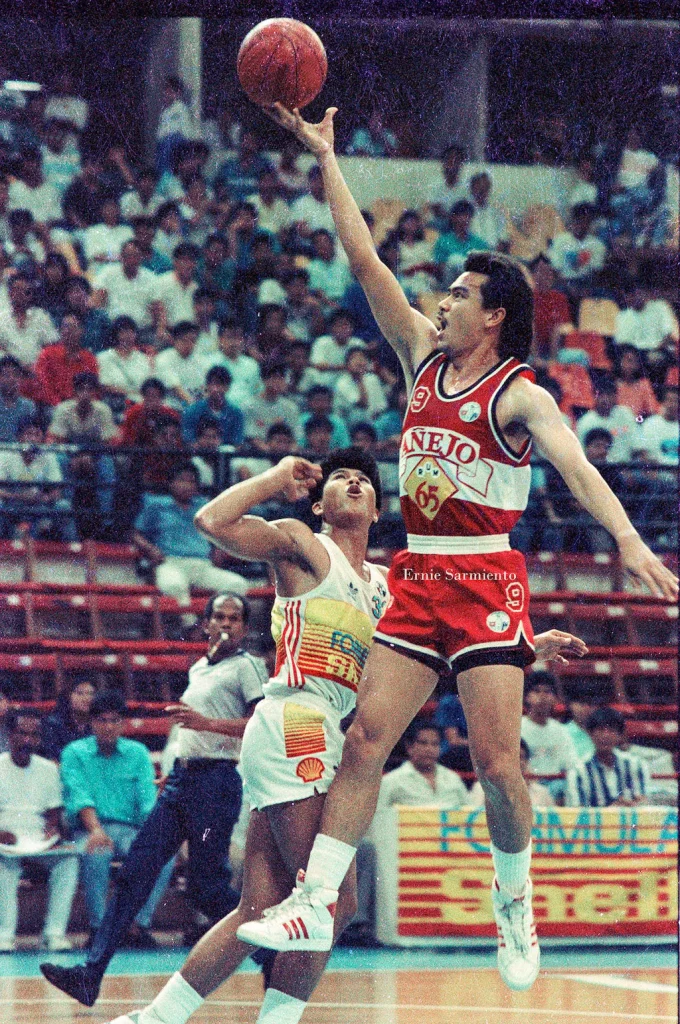
College career
Leandro “Leo” Isaac piloted the Mapua Cardinals to the 1981 NCAA crown. In the same year, he also grabbed the MVP plum. Standing 6’1”, he was among the few guards at the time that stood above six feet. He played for MU (then called MIT) from 1978 to 1981 alongside other notable Cards like Joel Banal, Junel Baculi, and Bong Ramos.
PBA career
Accomplishments: 4x champion; played from 1986 to 1995 for two franchises – Ginebra and Shell; played a total of 366 games, averaging 6.88 points, 2.47 rebounds, and 2.1 assists.
Isaac was selected by Great Taste in the 1985 Rookie Draft but was left unsigned. The following year, Jaworski plucked him from the PABL ranks to join Ginebra mid-season. In his rookie year, Leo helped the Gin Kings win their first ever PBA championship during the Open Conference. It was the tournament where the dreaded import duo of Billy Ray Bates and Michael Hackett wreaked havoc in the PBA, which concluded with Ginebra winning the series, 4-1, over the Manila Beer Brewmasters. Isaac later on rose to becoming a starter for the Gin Kings at the shooting guard position. He played for the franchise until 1991, winning a total of three PBA diadems. He played briefly for Shell and won a title with the Turbo Chargers in 1992 before going back to Ginebra in 1994. He retired in 1995. Years later, Isaac became an accomplished basketball coach, winning his first championship in 1998 for Doctor J in the Philippine Basketball League. He also steered his alma mater to back-to-back semis appearances in the NCAA in 2007 and 2008. He also had head coaching stints in the PBA for Barako Bull and Blackwater.
3. Freddie Hubalde (NCAA 1972-1973, PBA 1975-1990)
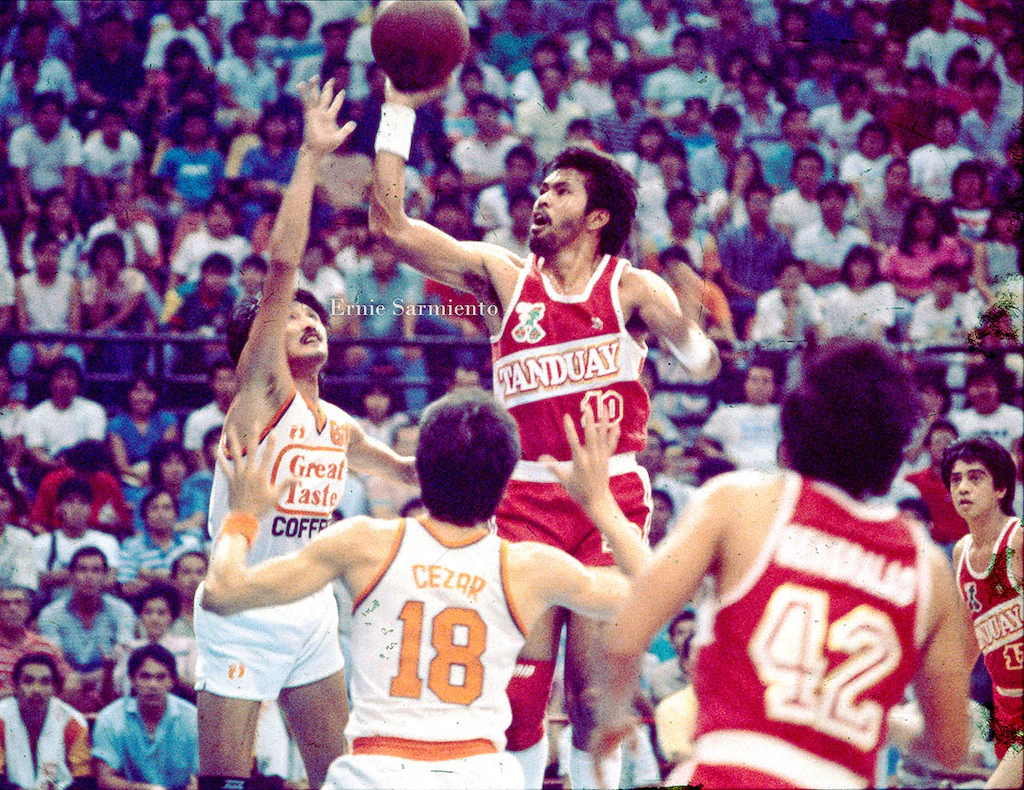
College career
Alfredo “Freddie” Hubalde played in the NCAA in the early 70’s, leading the charge for then Mapua Institute of Technology, and winning the MVP award in 1973. Standing 6’1” and gifted with athleticism, Freddie was an exciting and high scoring shooting forward for the Cards.
PBA career
Accomplishments: 16x champion (2nd most titles by a player in league history); 1977 MVP; 3x Mythical First Team (1977, 1978, 1986), One of the 25 Greatest Players of all time in the PBA; Played from 1975-1990 for Crispa, Tanduay, Purefoods, Shell, and Añejo; played a total of 793 games, averaging 12.35 points, 3.94 rebounds, and 2.50 assists; 25 PBA Greatest Players of All Time.
Freddie was part of the pioneering class that debuted with the league in 1975. He formed part of the formidable Crispa Redmanizers team with fellow stars Bogs Adornado, Atoy Co, and Philip Cezar. In the PBA’s first ever season, Hubalde’s Redmanizers would lose in the finals of the first two conferences to archrival Toyota. But in the Third Conference, Crispa finally got one over Toyota, snatching the All-Filipino tourney’s gold, the team’s first of many. Hubalde would become one of the stars of the multi-titled PBA franchise. In fact, two years after the league’s inception, Freddie would win the MVP award in the 1977 season. He was also voted the Mythical First team for three seasons – 1977, 1978, and 1986. With Crispa, Freddie harvested a total of 13 PBA titles.
Hubalde became of the best shooters in the league. He was also known for using the glass board as a target for his shots. When the Redmanizers disbanded in 1984, Hubalde moved to Tanduay and formed another solid roster with Ramon Fernandez, Willy Generalao, JB Yango, and Padim Israel. The Rhum Makers were reinforced by highly talented American guards – Rob Williams and Andre McKoy – as imports in the 1986 First Conference. The imposing Tanduay roster upended Great Taste, 4-2, to win the club’s first ever PBA championship. In the following conference, the Rhum Makers copped their second straight crown during the All-Filipino tournament at the expense of Ginebra. In Game 4 of that series, Hubalde sank both free throws off a Jaworski foul that clinched the game and the series for Tanduay. The next year, it was David Thirdkill’s turn to lead the Rhum Makers to another title, in the 1987 Open Conference. It was the club’s third championship in four tournaments and Freddie’s 16th, making him the second player in league history with the most titles, after Fernandez, who has 19.
Hubalde was voted as one of the 25 greatest PBA players of all time.
2. Atoy Co (NCAA 1970-1972, PBA 1975-1988)
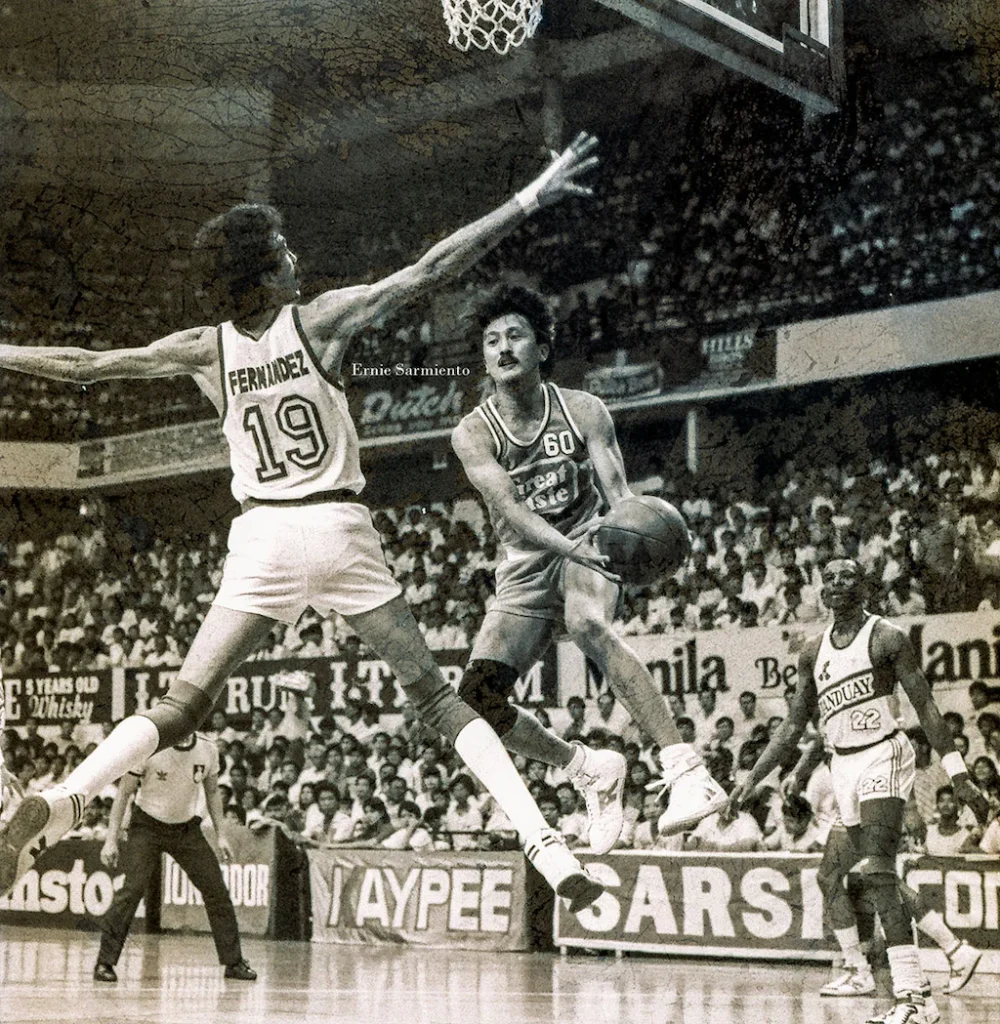
College career
Fortunato “Atoy” Co became a star the moment he stepped on the NCAA floor as a Mapua Cardinal. He played three years in the NCAA as Mapua’s main gunner, from 1970 to 1972. At 6’2”, Co was taller than most guards, which gave match-up problems to opponents. He bagged back-to-back MVP honors in 1970 and 1971.
PBA career
Accomplishments: 15x champion (including two grand slams with Crispa); 1979 MVP; 9x Mythical First Team; Ranked 4th in all-time leading scorers with a total of 12,994 career points; first to score 5,000 points and 10,000 points in the PBA; played 14 seasons from 1975 to 1988 for Crispa, Manila Beer, and Great Taste/Presto; played a total of 749 games averaging 17.3 points and 3.5 assists; member of the PBA Hall of Fame and the 25 Greatest Players of All Time.
Atoy was part of the first batch of PBA players during the league’s birth year in 1975. Already notable for his scoring prowess, he was expected to take the league by storm from the get go. And that he did. Called the “Fortune Cookie”, he indeed brought great fortunes to the Crispa franchise, joining forces with other hoops stars at the time to dominate the PBA. The first ten PBA conferences saw only two sides winning the championships – the immortal Crispa and Toyota squads – with the Redmanizers winning six. This started the fierce rivalry between the two franchises, the first and most popular rivalry in the league. During the six-conference reign of Crispa, from the 1975 All-Filipino Cup to the 1977 Open Conference, Co and company won the first of two grand slams (three straight titles) in the league.
But it was in 1979 when Co took over the PBA, averaging 23.2 points per game on his way to winning the MVP plum. In the same season, he became the first player in the league to reach 5,000 points. It is important to note that during this time, the three-point shot was not implemented yet. If it were, he would have averaged over 30 points for sure. The three-point shot was first introduced the following year, in 1980.
Atoy’s patented shot was the turn-around fade-away jumper, which was a nightmare to the defense. He had always been a scoring machine for most of his PBA years that he was also the first to reach 10,000 points, which he did on May 1, 1984. Currently, he ranks fourth in all-time scoring behind Mon Fernandez, Abet Guidaben, and Alvin Patrimonio. He also has one of the best shooting percentages of all time. On the free-throw line, he made 1,549 out of 1,970 shots for a remarkable 78.6% career clip. He also dished out a total of 2,640 dimes throughout his stellar career for a spectacular 3.52 assists per game.
Co’s 15th and last PBA title came in 1987 when he reunited with Crispa teammates Philip Cezar and Bernie Fabiosa to lift Great Taste over Hills Bros. and annex the All-Filipino crown. Deservingly, he was selected to be part of the first batch of inductees to the PBA Hall of Fame in 2005, as well as the 25 Greatest PBA Players of All-Time list.
1. Alvin Patrimonio (NCAA 1983-1986, PBA 1988-2004)
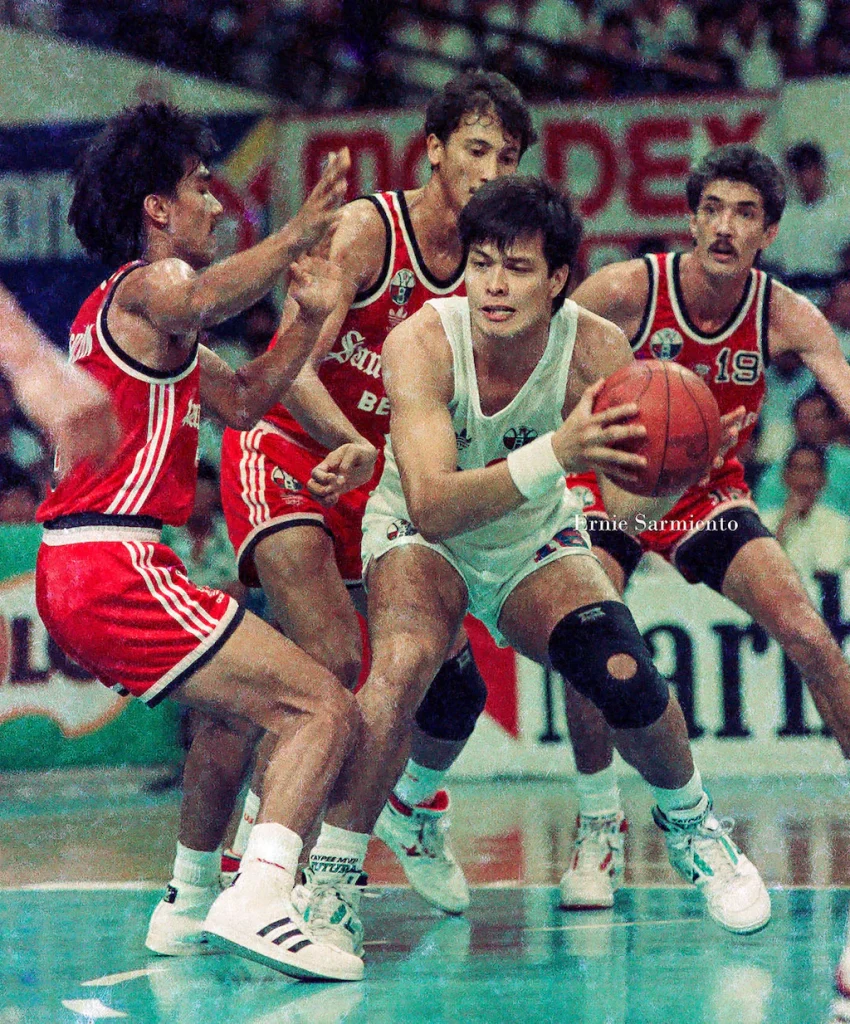
College career
Alvin Patrimonio had always been a special basketball player. He would stand out wherever he played, with his great talent, footwork, physical strength, and intelligence. In the NCAA, he was a man among boys, especially in the post. He led Mapua in its campaign from 1983 to 1986, and took home MVP honors in both the 1985 and 1986 seasons.
From the NCAA, he helped the YCO Shine Masters win two Philippine Amateur Basketball League (PABL) titles, and also one for the Swift Hotdogs.
PBA career
Accomplishments: 6x champion (three in the Philippine Cup); 4x MVP (2nd most in the PBA); 3x Best Player of the Conference; 10x Mythical First Team; 3x scoring champion (1992, 1993, 1998); 1991 All-Star MVP; 12x All-Star; 1993 PBA Press Corps Newsmaker of the Year; PBA Hall of Fame; member of the 25 Greatest Players of All Time; no. 3 all-time leading scorer; no. 4 all-time leading rebounder; no. 1 in most consecutive games played – 596 games; only 1 of 8 players in history to play at least 800 games; played 17 seasons from 1988 to 2004, all for the Purefoods franchise; Played a total of 857 games averaging 17.6 points, 7.2 rebounds, 2.4 assists, 0.7 blocks, 53.1% FG shooting, and 35.6 minutes.
Patrimonio’s achievements in the PBA are phenomenal, to say the least. He is without a doubt one of the top three best players of all time. One of the direct hires of Purefoods in 1988, his entry to the PBA met a stumbling block as Alvin was the object of a tug-of-war between two corporate competitors – Purefoods and Swift. Before turning pro, he steered Swift to the PABL championship. He got clearance to play for Purefoods much later in the season, which probably caused him to lose the battle for the Rookie of the Year honor to teammate Jojo Lastimosa. But Patrimonio soon became the team’s top player and along with a powerhouse cast that includes buddy Jerry Codiñera, Glenn Capacio, Lastimosa, and Dindo Pumaren, spearheaded several championships for the TJ Hotdogs. Known as “The Captain” and “The Face,” the 6’3” power forward from Cainta, Rizal held the PBA MVP trophy four times – 1991, 1993, 1994, 1997 – to become only the second in league history to do so after Ramon Fernandez. He was also only the second player in league history to win back-to-back MVP honors (1993 and 1994) after William Adornado. Curiously, it was in the 1992 season that he set his best scoring year, posting 25.2 points per game, to go along with 3.3 assists per game (also his personal best), 10.0 rebounds per game, and 1.1 blocks per game. Patrimonio was also the second to win three Best Player of the Conference (BPC) awards, after Vergel Meneses.
Patrimonio is currently the no. 3 all-time leading scorer in the PBA with a total of 15,091 points, behind only Fernandez and Guidaben. He also ranks fourth in all-time best rebounders with over six thousand boards. Patrimonio played 596 straight PBA games, the most by any player in league history at the time, and only one out of eight players to ever play at least 800 games. He played a total of 857 official PBA games, averaging prolific numbers – 35.6 minutes, 17.6 markers, 7.2 caroms, 2.4 dimes, and 0.7 swats, with a 53.1% shooting clip.
In 1990, Patrimonio was called for national duties being a part of the elite PBA Dream Team that competed in the Beijing Asian Games of the same year, and took home the silver medal. He played in the Asian Games for a total of four times, joining Allan Caidic as the only players to do so. He was also part of the Centennial Team of coach Tim Cone to win the 1998 Jones Cup for the country.
Today, Patrimonio remains with the only team he ever played for – Purefoods/Magnolia – as the team manager since 2004.
Honorable Mentions: Benny Cheng, Victor Sanchez, Yousef Taha, Chito Victolero
PREVIOUS LISTS
